Dear Reader, in this age of AI created content, please support with your goodwill someone who works harder to provide the human-made. Sign up at the top of the lefthand column or bottom of this page. You will receive my hand illustrated monthly newsletter RESTORE NATURE and access to the biodiversity garden design course as I write...and nothing else, I respect your time. I am also removing the advertizing as best I can as its become intrusive inappropriate and pays me nothing.
Learn to plant a garden for biodiversity, carbon sequestration and nutrient dense food.
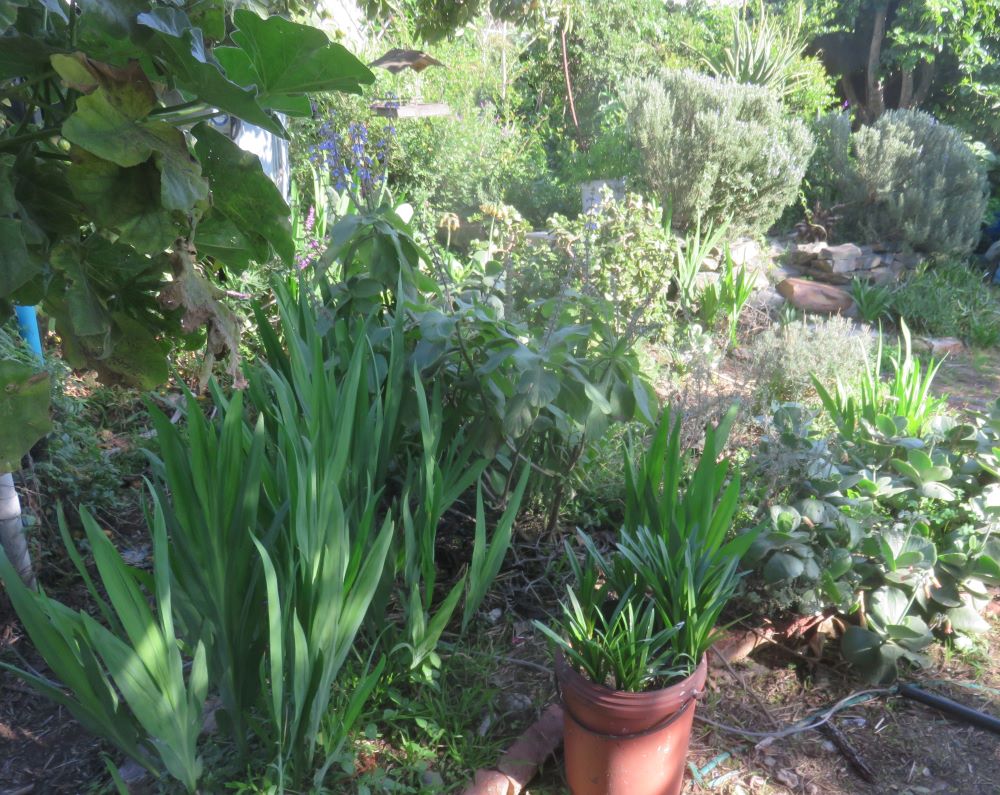 The garden in winter
The garden in winterWhy plant a garden ?
Gardens can be good for biodiversity. In England suburbs with gardens are more likely to support a greater variety of invertebrates than farm land. This isn't really because all gardeners are fabulous wildlife stewards, but because agriculture has such a negative effect on insect diversity that gardens look good by comparison. Thus just having a garden with a lot of different plants and flowers can have a positive effect. But we can do even better than that. The aim of this website is to help with tips on how you can design a garden that will achieve greater biodiversity, protect and improve your soil, and surround you with beauty while producing food and medicine. There are a lot of useful articles on the different aspects of nature friendly garden practice. If there is anything you would like to discuss, or any aspect you feel is missing, please pop me a message. Authors love questions and comments. It is unbelievably helpful to us in tailoring what we do to improve our service to you.
Can you save the world single handed ? That is debatable, but what is certain is that you CAN plant a garden that helps support wildlife and locks down carbon in the soil, saves water and food miles, and produces vegetables that are more health giving than the usual store bought version.
You can learn more on this website about people who have had positive results achieving this ecological goal and my own learning in pursuing it. There are also a number of NPO's and workshops one can join and learn from in Cape Town which are biodiversity focused.
I believe in honesty when it comes to sharing gardening experience, otherwise one can't learn from one's pain. How can we trust online gardening 'information' in which all seeds germinate in a week and will grow in any soil. Growing plants has few general rules which hold up without exceptions. There is so much to learn. It exercises one's analytical abilities and memory. It should be the most prestigious and highly paid of professions, but the opposite is the case. Gardening lacks prestige because it is accessible to everyone. This is a beautiful thing.
Sometimes I've asked myself what good is served by planting a garden. Isn't it just selfish and about beautifying one's own space. Surely individual small actions don't count in the fight against climate change and its the big battles with industry that need to be won. Against this I offer the argument that gardening is extremely important. Home gardeners with small private gardens, small holder farmers, victory gardeners and gardening projects in city spaces are an extremely powerful force against biodiversity loss and a warming climate, and I'll get deeper into my reasons why, as we go.
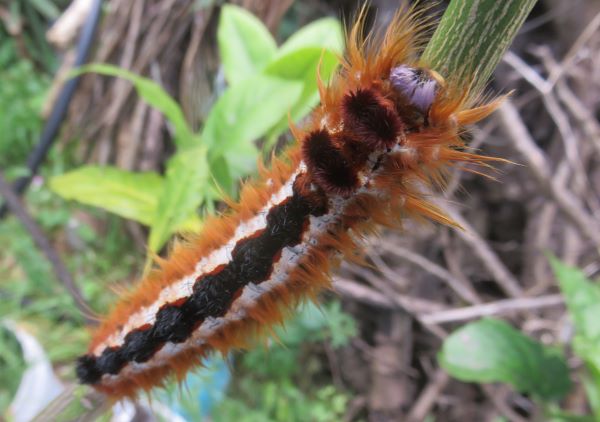 The gorgeous Lappet moth caterpillar with sparking whiskers and rippling gait.
The gorgeous Lappet moth caterpillar with sparking whiskers and rippling gait.On the topic of biodiversity, British wildlife organizations claim that private gardens alone take up more space than nature reserves in England. That was a wake up call for me. However, countries differ enormously in the amount of land given over to urban gardens, or potential gardens, and protected areas, and globally the amount of urban land when compared to protected land is very small. But this is skewed by the fact that most of the world's protected land is in only five countries. Most countries probably have way too little protected land. Taken together, private gardens constitute a potential means of increasing the space in a country that is given over to preserving wildlife. This 'wildlife' would mainly be the smaller kinds of creatures which are the foundation of the food chain such as insects, frogs, lizards, mice, snails and small birds. Thinking they are not important because of their tiny size is forgetting their enormous numbers, diversity, soil creating, pollinating, pest management and ecosystem stabilizing labor and that they are the foundation of the food chain which supports larger life forms.
Yet it is this very foundation of life, which many gardeners loathe. They would rather not see a creepy crawly, a hopper, a spinner, a flyer, a drifter, in their gardens, considering all uninvited life in the garden unwelcome. Unfortunately most gardeners in my country are angry with these little things. So gardeners CAN be like one person wrecking balls when it comes to wildlife protection and keeping poisons out of the environment. On the other hand I firmly believe that people would do things differently if they just had more information. So the project of this website is to share why we need to 'garden for life' and to describe how I've tried to do this (and failed sometimes), and cite other examples to learn from.
I really believe that the reason why not all private gardens are friendly places for small creatures is because some gardeners have been terribly misinformed, and been brainwashed into believing that their main gardening task is waging war on nature. There is an obvious reason for this. The barrier is not in the heart of the gardener, but in society at large and what is taught about gardening by people who make money from garden warfare. Part of the obstacle to billions of people around the world making wildlife friendly gardens is a surfeit of destructive knowledge in attractive packaging. To use the arsenal required to raise the showy plants in the catalogues one needs a highly developed skill set of biocidal knowledge.
In order to scale up and multiply into billions the presence of small wildlife gardens around the world, a set of biogenerative skills needs to become widely spread that stands in opposition to the biocidal skills. Learning how to create a sanctuary for life and delving into the wildlife garden creation process is therefore my project. I explore some different types of natural gardening here. Anyone who contributes their knowledge on natural gardening and working with and supporting nature is taking part.
I feel it is my duty, and the privilege of all those who value diversity, and are privileged to have a garden, to spread the word, and lavishly broadcast tips that we’ve gleaned on how to help support biodiversity, and how not to hurt it.
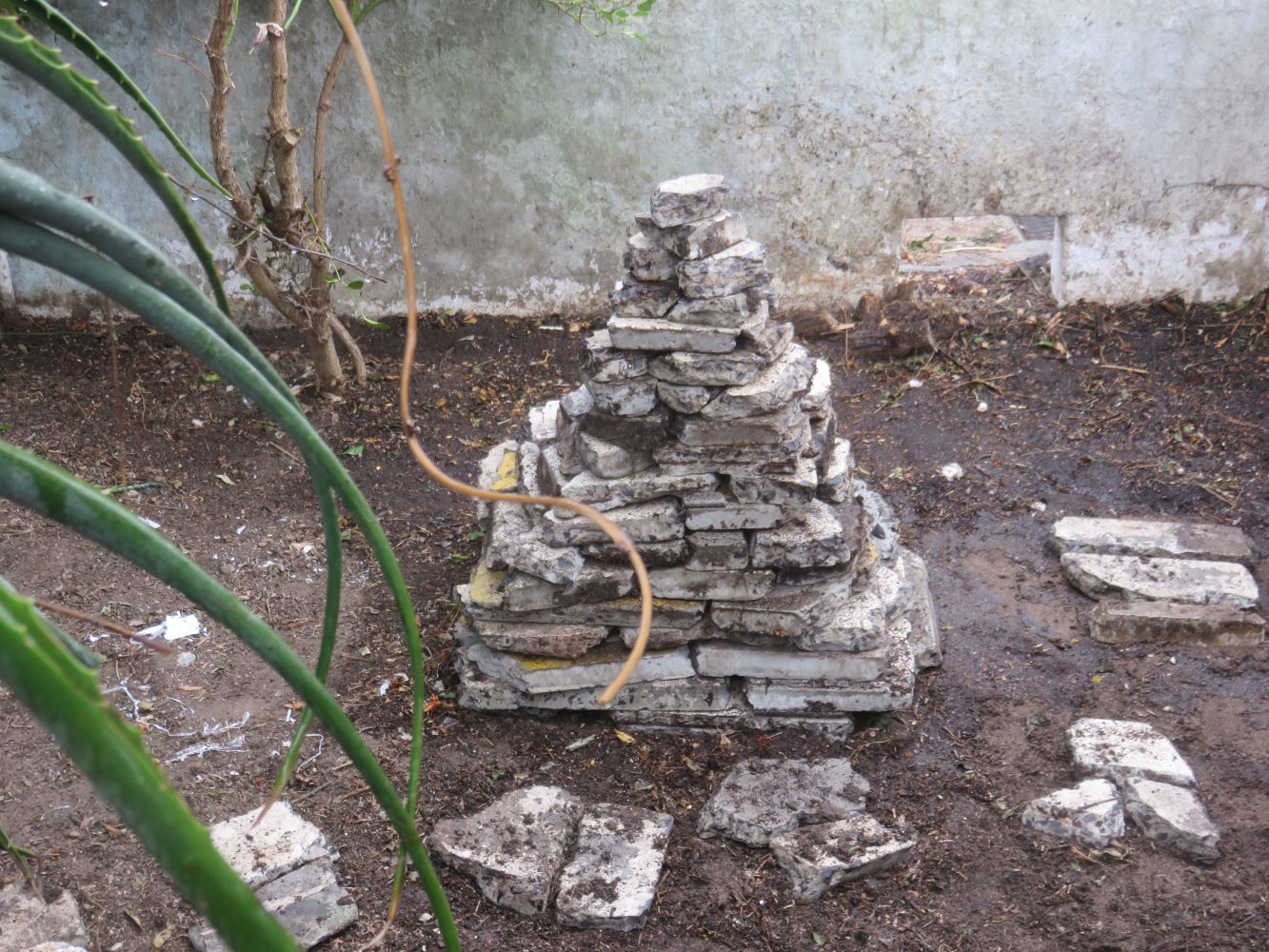 Inspired by Markus Gastl I built an insect and reptile 'hotel' out of recycled concrete rubble. Two years later my garden teams with little geckos.. a coincidence ?
Inspired by Markus Gastl I built an insect and reptile 'hotel' out of recycled concrete rubble. Two years later my garden teams with little geckos.. a coincidence ?Inspiration to plant a garden ?
We don’t know everything because nature is too deep for that, but we can learn from people who have had positive results. There are some gardeners around the world who are really inspirational. For example there is the Naturgarten movement in Germany. One of the greatest natural gardeners and supporters of insect biodiversity is Markus Gastl and his Hortus garden network which are insect diversity boosting gardens all around the world. I've registered my garden as a stepping stone garden for a local project based on the motivation he gave me. The British wildlife garden movement has many admirable adherents with much to teach. The north American prairie garden movement has much to offer, although some of its adherents' methods I wouldn't personally follow as weed killers and insecticides are not excluded in principle. Then there are fabulous 'wild' gardens built by Dutch designers. We can also learn much from activists and rehabilitation in Mexico, India and China. Every region of the world has wisdom to offer, from the desert floor to the icy mountain tops. Each context is unique, and yet so much knowledge is transferable.
Plant a garden on a human scale
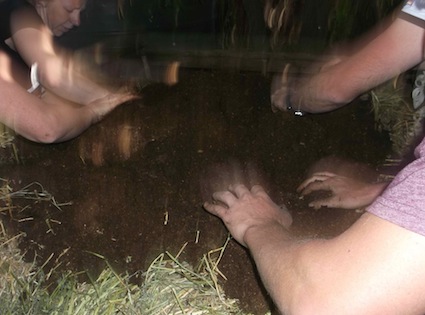 The passionate touch of permaculture students at a workshop
The passionate touch of permaculture students at a workshopThere is something else that is peculiar about gardens beyond the enormous space they occupy en masse. There may be a very good ecological reason why the first garden in which we were given our first divine occupation, to tend, was called ‘the garden of Eden’ and not ‘the farm of Eden’. Agriculture as predominantly practiced in the past has turned out to be a destructive process, not really what one could call ‘tending’ at all.
An individual tending a private garden can give it the kind of attention and thought nature needs, and allow space for things that don’t turn a profit but benefit mother earth and have long term benefits to everyone. This cannot be said for industrial agriculture, by and large, in which the profit motive in the short term has been the driving force, by necessity, because of the way our global economy is structured. The private garden isn’t usually there to turn a profit, and that is its saving grace, in our earth saving project.
Agriculture, even in the stone age, has not been good for nature. In the past, agriculture has created deserts out of fertile regions of the globe, perhaps by extraction outweighing inputs, or having a ‘naked earth’ policy of leaving land bare in the off seasons, felling trees or overgrazing, thus even 'organic' agriculture can be a negative force if means of conserving soil and biodiversity are either not known or practiced.
Industrial agriculture makes a major contribution to green house gas emissions, as well as deforestation, the destruction of small and large non-human life, the breaking of our earth-cooling water cycles, and the infertility as well as the erosion of our arable land. There is a turn in another direction, and I would love to support farmers who are trying to do less damage.
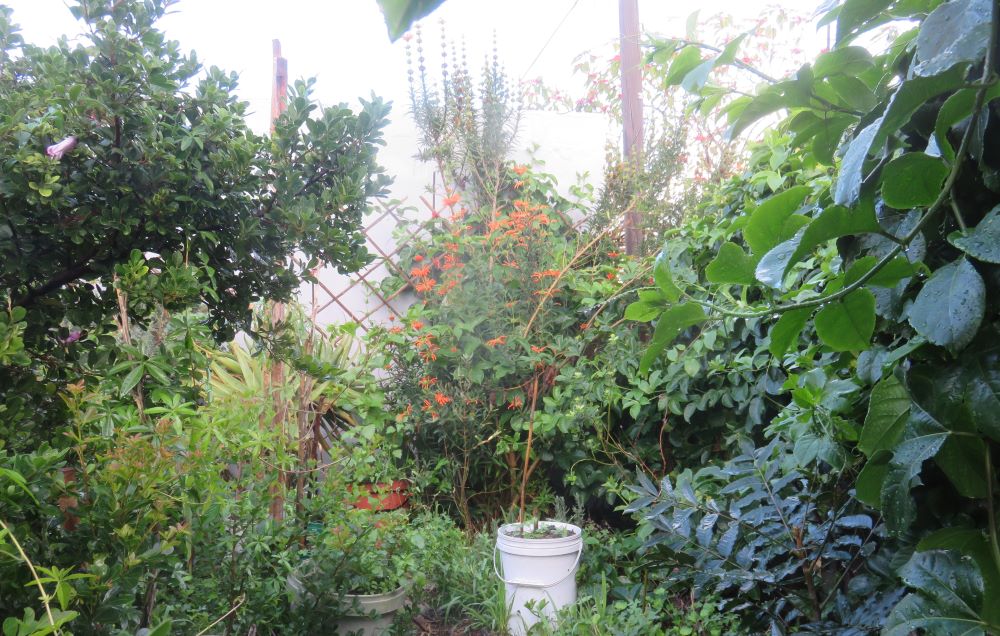 A mix of indigenous medicinal and exotic food plants
A mix of indigenous medicinal and exotic food plantsThe earth smiles when you plant a garden
Multiple benefits are accrued for our climate when you plant a garden. The most obvious being the sequestration of carbon and the provision of shade but the most significant may be the role of plants in creating soil health which heals the small hydrological cycles that cool local climates. Read more on these topics in the article on the power of plants.
Another benefit is that through growing food where it is eaten, one cuts out the emissions created by transportation, and of course, by using ecological growing methods one avoids the use of fossil fuels needed for ploughing, fertilizing and creating biocides, and by composting manures aerobically we reduce the production of more climate toxic anaerobic products like methane.
What you will find on this website
The aim of this website is to help you create biodiversity and climate cooling gardens.
It takes many years to build a website like this and there is an archaeology of my own growth in the articles which were created at different times. .
I've taken many directions in my attempts to create an earth friendly garden, starting with the notion of the 'water wise' garden, because of a dangerous water shortage in our city in 2018. I've recorded what I've learned through the iterations of pursuing 'nature' and encountering many different belief systems about how to do this. All this time I've been sorting out for myself which system had the greatest value. The idea of the the climate and biodiversity friendly food garden feels like the best fit. It is the result of a long development process. All the other directions I've followed had profound and useful lessons for me, but I began to see flaws, almost always due to generalization in methodology, theory or practice, and lack of effective ideas on how to boost biodiversity. Somehow the particular gardening process was just supposed to create it. Nonetheless all these movements are part of a solution and their way of seeing things is part of my own discourse.
Links to the different aspects of this project of garden building will show you how completely everything is connected. One cannot speak about water without touching on soil. Every parameter of gardening will be of relevance to other areas of endeavor, and the topics cannot be isolated, but in the attempt to build a coherent structure for the website and make it possible for readers to pursue threads of enquiry I’ve divided up the study of the forces in gardening as follows:
exploring some different types of natural gardening
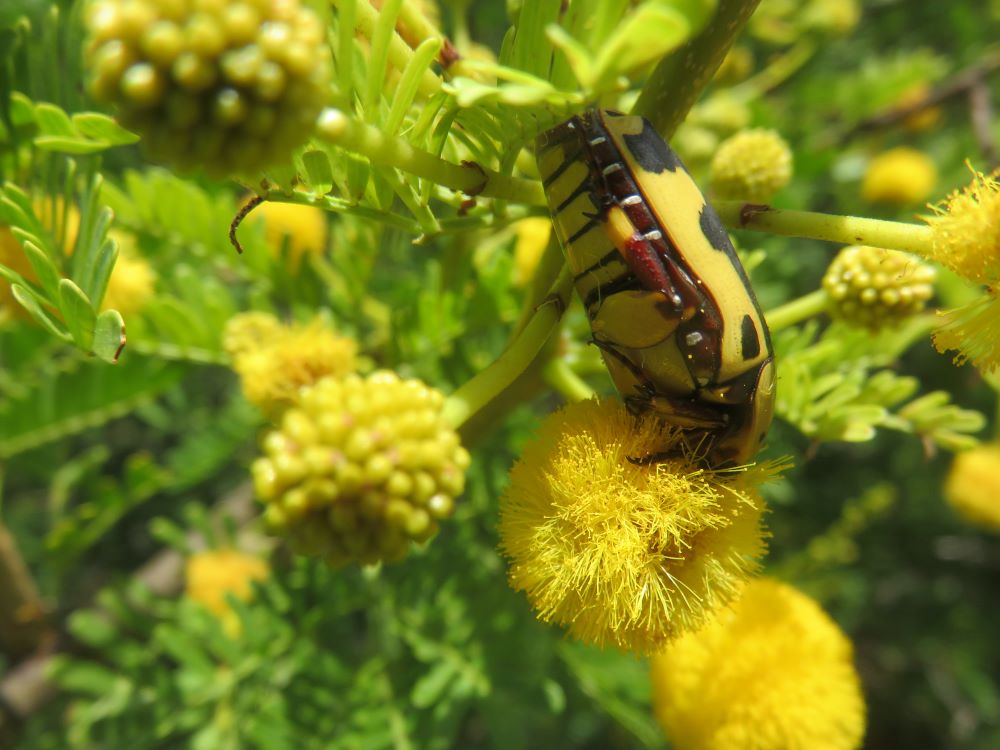 The thorn tree's flowers attract a host of insects which either pollinate or devour our food, and mother birds which feed their young with the insects.
The thorn tree's flowers attract a host of insects which either pollinate or devour our food, and mother birds which feed their young with the insects.You can click the links above, or go to my site map or the bar at the top to navigate to these topics. This 'gardening for life' idea has many parts to it and I can’t do an adequate job alone. The complexity of nature is beyond our grasp as a species, to say nothing of the grasp of one individual. This is why under ‘gardening philosophies’ you can contribute your experiences to ‘popular and community knowledge from readers’ to help all of us gain in knowledge and help ‘save the world’.
Researching, trying out experiments in my garden and travelling around to observe nature or successful projects, and then writing about all of these is a full time job. No I lie, its enough work for a team of people, so please help either by buying a book or a t-shirt, or contributing your experience under ‘gardening philosophies’ and be part of the knowledge creation
I’m passionate enough about the planet healing power of plants to do this without pay, but I’ve found it doesn’t work out. There is only so much time. If I earn money by writing and gardening I can write more about gardening, otherwise I’m forced to do some other activity to earn money that takes me very far away from this life’s mission. Because I must put bread on the table, please help me by going to the link below or to the books in the side bar.
‘Art in the garden’ includes articles about my art, and gives links to art products. I do some designing and illustrating in addition to writing for the website and self publishing its books, which is the earning activity I hope will not take me too far from the mission.
Thank you for reading this far. May your garden grow and your neighbors learn from your efforts.
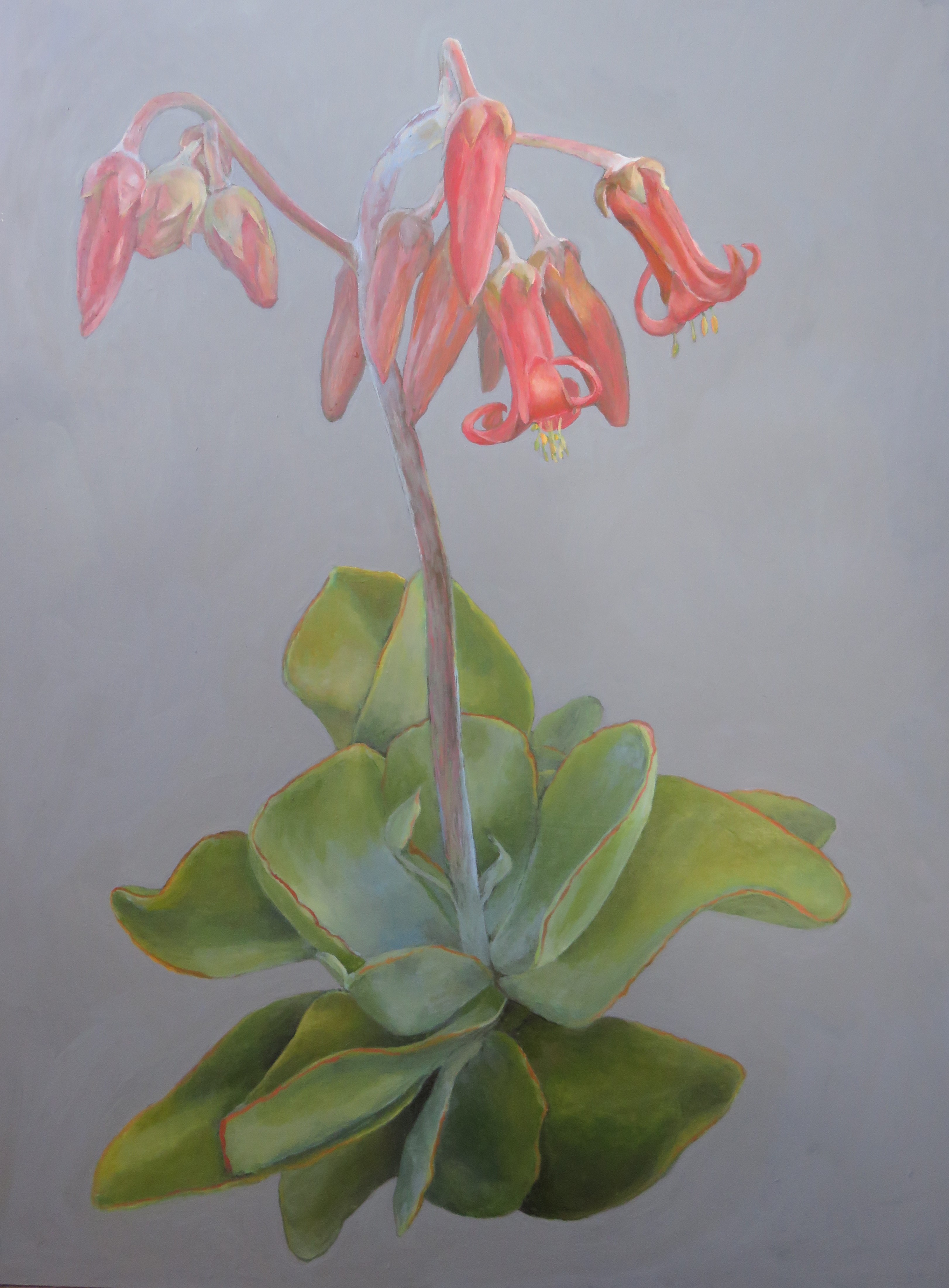 A medicinal succulent plant from South Africa I painted in acrylics for art prints.
A medicinal succulent plant from South Africa I painted in acrylics for art prints.Restore Nature Newsletter
I've been writing for four years now and I would love to hear from you
Please let me know if you have any questions, comments or stories to share on gardening, permaculture, regenerative agriculture, food forests, natural gardening, do nothing gardening, observations about pests and diseases, foraging, dealing with and using weeds constructively, composting and going offgrid.
What Other Visitors Have Said
Click below to see contributions from other visitors to this page...
Rose 




I am doing research on growing wildlife foraging plants to use in enhancement plantings with wildlife in mind.
My thoughts after seeing bears too skinny …
Your second block of text...
SEARCH
Order the Kindle E-book for the SPECIAL PRICE of only
Prices valid till 30.09.2023
Recent Articles
-
garden for life is a blog about saving the earth one garden at a time
Apr 18, 25 01:18 PM
The garden for life blog has short articles on gardening for biodiversity with native plants and regenerating soil for climate amelioration and nutritious food -
Cape Flats Sand Fynbos, Cape Town's most endangered native vegetation!
Apr 18, 25 10:36 AM
Cape Flats Sand Fynbos, a vegetation type found in the super diverse Cape Fynbos region is threatened by Cape Town's urban development and invasive alien plants -
Geography Research Task
Jan 31, 25 11:37 PM
To whom it may concern My name is Tanyaradzwa Madziwa and I am a matric student at Springfield Convent School. As part of our geography syllabus for this
"How to start a profitable worm business on a shoestring budget
Order a printed copy from "Amazon" at the SPECIAL PRICE of only
or a digital version from the "Kindle" store at the SPECIAL PRICE of only
Prices valid till 30.09.2023







